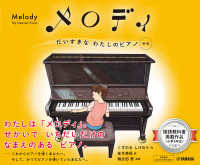- ホーム
- > 洋書
- > 英文書
- > Family / Marriage
Full Description
In this monograph we (1) provide an account of young children's socialization with respect to death and (2) develop a conception of children's understanding of death that encompasses affective and cognitive dimensions. Conducted in a small city in the Midwest, the project involved several component studies employing quantitative and qualitative methods. Middle-class, European American children (3-6 years, N = 101) were interviewed about their cognitive/affective understandings of death; their parents (N = 71) completed questionnaires about the children's experiences and their own beliefs and practices. Other data included ethnographic observations, interviews, focus groups, and analyses of children's books. Parents and teachers shared a dominant folk theory, believing that children should be shielded from death because they lack the emotional and cognitive capacity to understand or cope with death. Even the youngest children knew basic elements of the emotional script for death, a script that paralleled messages available across socializing contexts. Similarly, they showed considerable understanding of the subconcepts of death, providing additional evidence that young children's cognitive understanding is more advanced than previously thought, and contradicting the dominant folk theory held by most parents. Although children's default model of death was biological, many children and parents used coexistence models, mixing scientific and religious elements. A preliminary study of Mexican American families (children: N = 27, parents: N = 17) cast the foregoing fi ndings in relief, illustrating a different set of socializing beliefs and practices. Mexican American children's understanding of death differed from their European American counterparts' in ways that mirrored these differences.
Contents
ABSTRACT vii
I. INTRODUCTION
Peggy J. Miller, Karl S. Rosengren, and Isabel T. Gutiérrez 1
II. EUROPEAN AMERICANS IN CENTERVILLE: COMMUNITY AND FAMILY CONTEXTS
Peggy J. Miller, Isabel T. Gutiérrez, Philip I. Chow, and Stevie S. Schein 19
III. AFFECTIVE DIMENSIONS OF DEATH: CHILDREN'S BOOKS, QUESTIONS, AND UNDERSTANDINGS
Isabel T. Gutiérrez, Peggy J. Miller, Karl S. Rosengren, and Stevie S. Schein 43
IV. COGNITIVE DIMENSIONS OF DEATH IN CONTEXT
Karl S. Rosengren, Isabel T. Gutiérrez, and Stevie S. Schein 62
V. COGNITIVE MODELS OF DEATH
Karl S. Rosengren, Isabel T. Gutiérrez, and Stevie S. Schein 83
VI. MEXICAN AMERICAN IMMIGRANTS IN THE CENTERVILLE REGION: TEACHERS, CHILDREN, AND PARENTS
Isabel T. Gutiérrez, Karl S. Rosengren, and Peggy J. Miller 97
VII. FINAL THOUGHTS
Peggy J. Miller and Karl S. Rosengren 113
REFERENCES 125
APPENDIX A 134
APPENDIX B 138
ACKNOWLEDGMENTS 141








